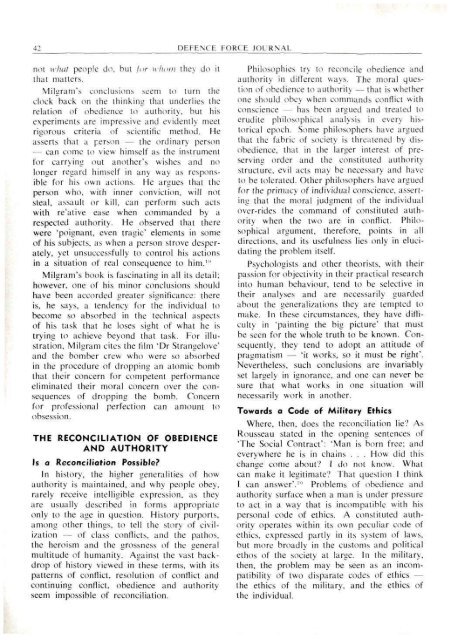ISSUE 1 : Nov/Dec - 1976 - Australian Defence Force Journal
ISSUE 1 : Nov/Dec - 1976 - Australian Defence Force Journal
ISSUE 1 : Nov/Dec - 1976 - Australian Defence Force Journal
You also want an ePaper? Increase the reach of your titles
YUMPU automatically turns print PDFs into web optimized ePapers that Google loves.
42 DEFENCE FORCE JOURNALnot what people do, but for whom they do itthat matters.Milgram's conclusions seem to turn theclock back on the thinking that underlies therelation of obedience to authority, but hisexperiments are impressive and evidently meetrigorous criteria of scientific method. Heasserts that a person — the ordinary person— can come to view himself as the instrumentfor carrying out another's wishes and nolonger regard himself in any way as responsiblefor his own actions. He argues that theperson who. with inner conviction, will notsteal, assault or kill, can perform such actswith re'ative ease when commanded by arespected authority. He observed that therewere 'poignant, even tragic' elements in someof his subjects, as when a person strove desperately,yet unsuccessfully to control his actionsin a situation of real consequence to him. 1 "Milgram's book is fascinating in all its detail:however, one of his minor conclusions shouldhave been accorded greater significance: thereis, he says, a tendency for the individual tobecome so absorbed in the technical aspectsof his task that he loses sight of what he istrying to achieve beyond that task. For illustration,Milgram cites the film 'Dr Strangelove'and the bomber crew who were so absorbedin the procedure of dropping an atomic bombthat their concern for competent performanceeliminated their moral concern over the consequencesof dropping the bomb. Concernfor professional perfection can amount toobsession.THE RECONCILIATION OF OBEDIENCEAND AUTHORITYIs a Reconciliation Possible?In history, the higher generalities of howauthority is maintained, and why people obey,rarely receive intelligible expression, as theyare usually described in forms appropriateonly to the age in question. History purports,among other things, to tell the story of civilization— of class conflicts, and the pathos.the heroism and the grossness of the generalmultitude of humanity. Against the vast backdropof history viewed in these terms, with itspatterns of conflict, resolution of conflict andcontinuing conflict, obedience and authorityseem impossible of reconciliation.Philosophies try to reconcile obedience andauthority in different ways. The moral questionof obedience to authority — that is whetherone should obey when commands conflict withconscience — has been argued and treated toerudite philosophical analysis in every historicalepoch. Some philosophers have arguedthat the fabric of society is threatened by disobedience,that in the larger interest of preservingorder and the constituted authoritystructure, evil acts may be necessary and haveto be tolerated. Other philosophers have arguedfor the primacy of individual conscience, assertingthat the moral judgment of the individualover-rides the command of constituted authoritywhen the two are in conflict. Philosophicalargument, therefore, points in alldirections, and its usefulness lies only in elucidatingthe problem itself.Psychologists and other theorists, with theirpassion for objectivity in their practical researchinto human behaviour, tend to be selective intheir analyses and are necessarily guardedabout the generalizations they are tempted tomake. In these circumstances, they have difficultyin 'painting the big picture' that mustbe seen for the whole truth to be known. Consequently,they tend to adopt an attitude ofpragmatism — 'it works, so it must be right".Nevertheless, such conclusions are invariablyset largely in ignorance, and one can never besure that what works in one situation willnecessarily work in another.Towards a Code of Military EthicsWhere, then, does the reconciliation lie? AsRousseau stated in the opening sentences of'The Social Contract': 'Man is born free; andeverywhere he is in chains . . . How did thischange come about? I do not know. Whatcan make it legitimate? That question I thinkI can answer'. 2 " Problems of obedience andauthority surface when a man is under pressureto act in a way that is incompatible with hispersonal code of ethics. A constituted authorityoperates within its own peculiar code ofethics, expressed partly in its system of laws,but more broadly in the customs and politicalethos of the society at large. In the military,then, the problem may be seen as an incompatibilityof two disparate codes of ethics —the ethics of the military, and the ethics ofthe individual.
















